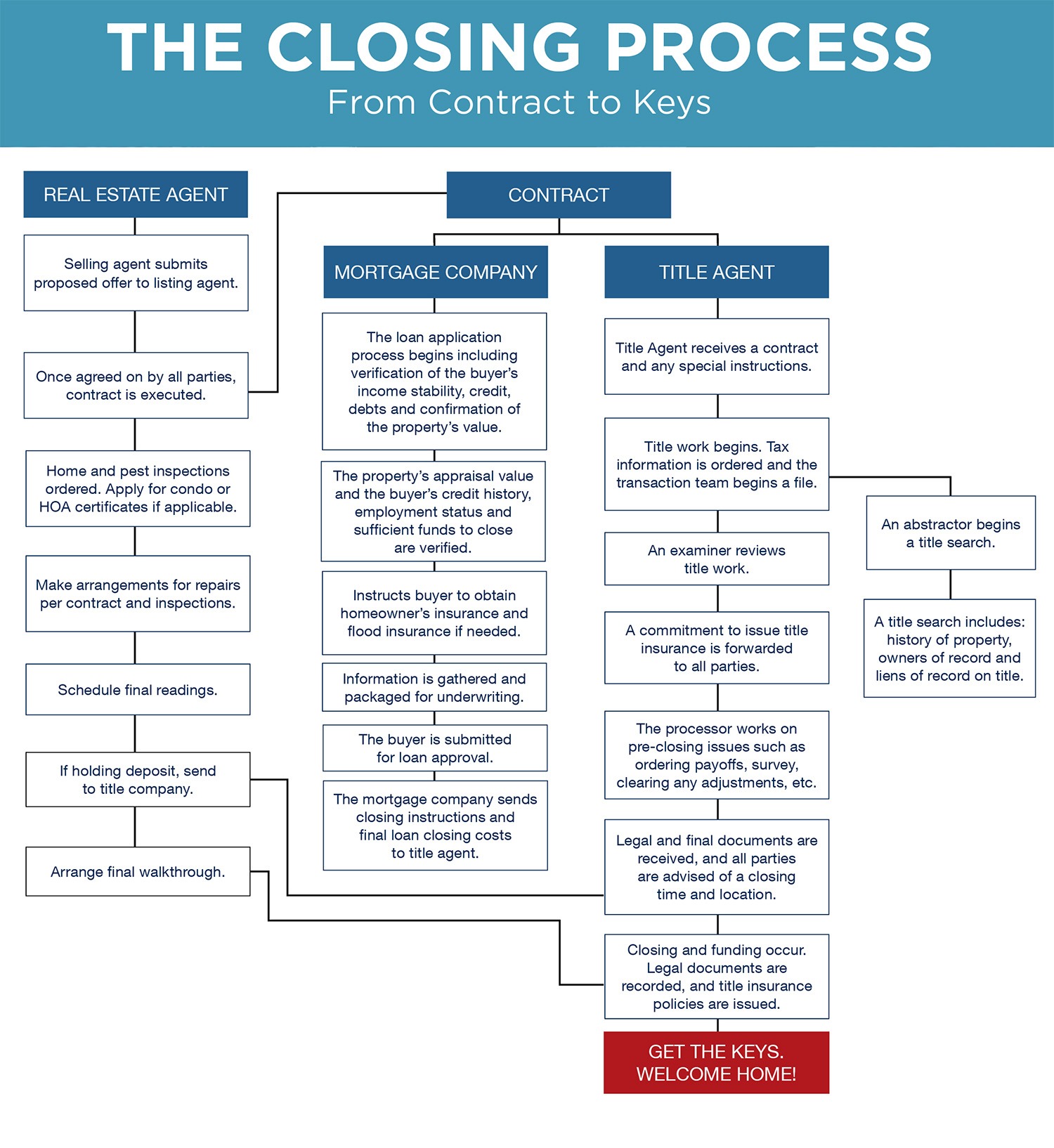Title Closing Services
The Closing: A real estate Closing is the time in the Sale and Purchase of real estate when the transfer occurs, and the Purchase Price is paid to the Seller and the Buyer is given the Title “Deed” to the Property. Closing costs are allocated, brokers are paid, and liens being paid off are recorded satisfied in order to transfer clean title. After the Closing, the transfer of the real estate from Seller to Buyer is completed, and the deal is ‘Closed’.
Helpful Links

Topics
What Does a Title Agent Do?
- Holding Escrow Funds
- Closing the Transaction
- Clearing the Title
- Issuing Title Insurance Policy
In general, the Title Agent is involved with and responsible for:
Holding Escrow Funds – the deposit paid toward the purchase is held by the Title Agent. At the closing, the balance of the money to close is provided by the Buyer, or the Buyer’s Lender, and is delivered to the Title Agent, who in turn is responsible for the disbursements at the Closing.
Clearing the Title – the Title Agent obtains information about the real estate’s title and if there are any pending claims being made against the title or ownership. This includes confirming the Seller’s ability to sell and transfer the title to the real estate to the Buyer, free of claims against the title.
Closing the Transaction – documents that are needed to Close the sale/purchase transaction are prepared, signed by the parties, and dealt with as needed, such as providing loan documents to Lenders, and recording deeds with the county recorder. The money to close the transaction are provided by the Buyer or Buyer’s Lender to the Title Agent who in turn distributes them where they are required to go, such as to the Seller, to real estate agents for commissions due, and to pay off any liens.
Issuing Title Insurance – as the Title Agent for the Closing, the Title Agent on behalf of the underwriter issues the Title Insurance for the Buyer that insures against claims against marketable title. If the Buyer has a Lender, then the Title Agent also issues a Lender title insurance policy to protect the Lender’s financial interest in the property from claims against marketable title.
Using Safe Escrow
Safe Escrow provides another layer of security and protection for your Closing.
A Title Agent is responsible for several essential aspects of a Real Estate Closing. It is important to understand that first and foremost, the Title Agent represents an insurance underwriter that is providing a Buyer with insurance that guarantees that the Buyer has purchased the Real Estate Property with Marketable Title, and that if not, the Underwriter will pay for the losses the Buyer may suffer. It is also important to note that when title insurance is purchased, it is a one-time premium amount that will protect you even if you decide to sell the property in the future. If there is a Lender that is loaning money to a Buyer to purchase the property, a Lender Title Insurance Policy will be required by the Lender to protect the Lender’s interest in the property. These title insurance policies pay valid claims and also pay for the legal fees to defend the Buyer and Lender against hidden title defects or claims, and using a Title Agent helps to reduce the risks of loss because of the thorough title searches and examinations that the Title Agent and the Underwriting go through when preparing for a Closing.
The Two Types of Title Insurance that Title Agents Provide: there are two types of insurance involved in a real estate closing; an Owner’s Policy and a Lender’s Policy. The Owner’s Title Insurance Policy protects the Buyer in the event there is a claim that the Buyer’s title ownership of the property purchased comes into question. For example, possibly the Seller did not actually have the legal right to sell the property. Or there could be a lien on the property that was for some reason not disclosed or discovered. These issues can cause a ‘cloud’ on title, which means the title or ownership to the Buyer could come into question or be challenged. A Lender’s Title Policy is required by a Lender when loaning money to the Buyer for the purchase of the property. While the Owner’s Policy protects the Buyer, the Lender’s Policy protects the Lender in case there is a dispute over the title and the Lender’s lien comes into question, and may not be valid. That could mean that the Lender loaned money but is not secured.
A BUYER SHOULD NOT JUST GIVE THEIR MONEY TO ANYONE – a Title Agent such as our law firm acts to ensure a smooth transfer of property. A Buyer does not want to just send hundreds of thousands of dollars or more to a Seller and hope that the Seller gives them a deed to the property. Rather a Title Agent, who is a neutral party in the transaction, makes sure that before the Buyer sends those hundreds of thousands of dollars out, that the Seller is actually transferring the Real Estate Property to the Buyer. While not actually a ‘middle man’ in a deal, the Title Agent serves as the go-between in a Real Estate Closing transaction. The Title Agent makes sure that the Seller gets their money due them from the sale, and that the Buyer gets Marketable Title to the Real Estate Property.
Get Free Case Evaluation
We at the Title & Closing Law Firm v2 take great care to provide skillful and diligent, with practiced efficiency, legal services and representation to our clients.
Happy Clients Say About Us
Our Affiliates & Partners





